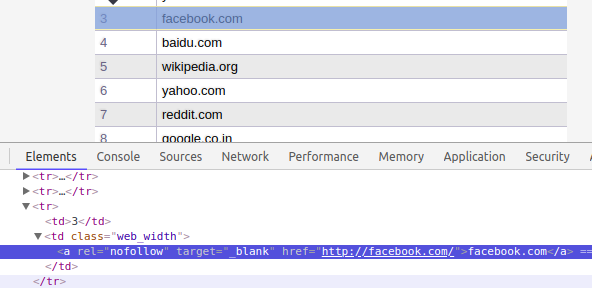
I needed a collection of different website links to experiment with Docker cluster. So I created this small script to collect one million website URLs.
Code is available on Github too.
Running script:
Either create a new virtual environment using python3 or use existing one in your system.
Install the dependencies.
pip install requests, BeautifulSoup
Activate the virtual environment and run the code.
python one_million_websites.py
Code:
import requests
from bs4 import BeautifulSoup
import sys
import time
headers = {
"Accept": "text/html,application/xhtml+xml,application/xml;q=0.9,image/webp,image/apng,*/*;q=0.8",
"Accept-Language": "en-GB,en-US;q=0.9,en;q=0.8",
"User-Agent": "Mozilla/5.0 (X11; Linux x86_64) AppleWebKit/537.36 (KHTML, like Gecko) Ubuntu Chromium/64.0.3282.167 Chrome/64.0.3282.167 Safari/537.36"
}
site_link_count = 0
for i in range(1, 201):
url = "http://websitelists.in/website-list-" + str(i) + ".html"
response = requests.get(url, headers = headers)
if response.status_code != 200:
print(url + str(response.status_code))
continue
soup = BeautifulSoup(response.text, 'lxml')
sites = soup.find_all("td",{"class": "web_width"})
links = ""
for site in sites:
site = site.find("a")["href"]
links += site + "\n"
site_link_count += 1
with open("one_million_websites.txt", "a") as f:
f.write(links)
print(str(site_link_count) + " links found")
time.sleep(1)http://www.websitelists.in/. If you inspect the webpage, you can see anchor tag inside td tag with class web_width. We will convert the page response into BeautifulSoup object and get all such elements and extract the HREF value of them.

Although there is natural delay of more than 1 second between consecutive requests which is pretty slow but is good for server. I still introduced one second delay to avoid 429 HTTP status.
Scraped links will be dumped in text file in same directory.
Hosting Django App for free on PythonAnyWhere Server.
Featured Image Source : http://ehacking.net/



